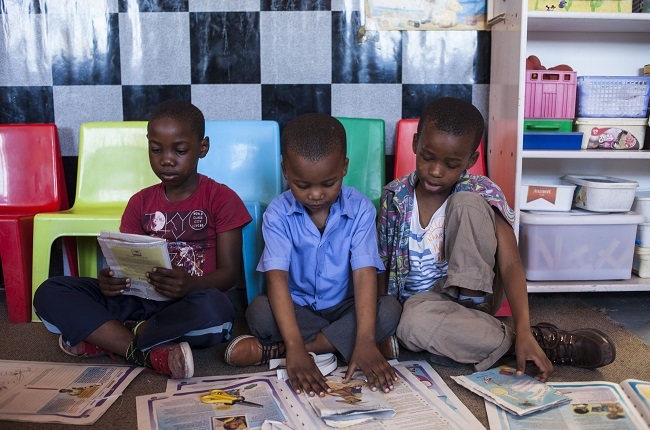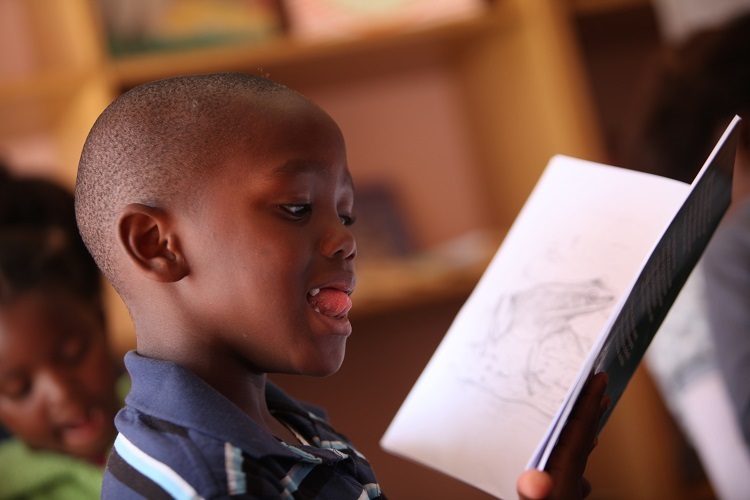Tshivenda-speaking children enjoy stories in their mother tongue thanks to Nal’ibali
“Reading and being read to in your own language should not be seen as an optional extra for children.” Photo: Supplied/Siya Mahomba.
Reading makes stories interactive, engaging, exciting and educational. It’s even more invigorating when children read the stories in a language they understand.
Nal’ibali gave children a sense of pride with their multilingual stories, which are available nationwide. Starting with the English-isiXhosa, English-isiZulu, and English-Afrikaans language combinations in 2012, no one knew that 10 years later the stories would be available in six more language combinations, including Tshivenda, their newest addition.
Starting Monday, March 28, Tshivenda-speaking children and their families have been able to enjoy free printed stories in their native language through the Nal’ibali Reading for Fun campaign.
Parents, book club leaders and other adults who run literacy programs are invited to sign up to receive free copies of the new Tshivenda edition of the Nal’ibali story “supplement”.
READ: ‘They seemed magical’: A local biologist shares the inspiration behind her first children’s book.
The storybook supplement – affectionately called “the Nal’ibali” by children and households across the country – is a multilingual diary booklet that contains three children’s stories, reading and writing activities, and advice and information for adults on how to read and enjoy the stories. with children.
Ten thousand copies of Tshivenda will now be printed per edition and published once a month, at least 10 times a year.
Katie Huston, Acting Director of Nal’ibali, said: “Reading and being read to in your language should not be seen as an optional extra for children. It is an essential and powerful part of learning to Reading. When you regularly read to children at home, you give them a solid foundation that not only makes reading easier, but all learning easier.”
Huston says the reason is threefold:
1. The foundations of language are laid and put in place early before children reach Grade R.
2. Children who are regularly exposed to meaningful and well-told stories in their language are better prepared to learn to read and write when they start school.
3. Having a deep and extensive vocabulary in their native language enables children to learn a second language, such as English.
Read also : Eradicate the stigma – A local author tells us about his children’s book on African spirituality.
Language structures our thoughts.
Ntshengedzeni Edward Mudau of the Pan South African Language Board says language brings the world into focus, gives structure to our thoughts and helps us communicate with the people around us.
“It is a powerful tool used to oppress, bring people together and liberate them. By printing stories in Tshivenda, Nal’ibali is helping to liberate Tshivenda-speaking children who will be able to read with understanding in their native language,” he added.
History Supplements
The history supplement was first published in English-isiXhosa, English-isiZulu and English-Afrikaans. It was launched in 2012 by literacy experts at Nal’ibali to overcome access as a critical barrier to literacy development in South Africa.
The history supplement is available in 10 languages and the aim is to publish it in all 11 official South African languages in 2023.
Must read: Browse local children’s stories in all official languages
Members of the public who wish to receive copies of the English-Tshivenda edition should register on the campaign site website here.
Registered recipients will pick up the story supplements from all Limpopo post offices. Each post office in Limpopo will have 20 extra copies to hand out to those who have not yet registered.
For more information on the Nal’ibali campaign or to access children’s stories in a range of South African languages, visit their website here or text the word “stories” to 060 044 2254.
Cat back:
Share your stories and questions with us via email at [email protected]. Anonymous contributions are welcome.
Don’t miss any story!
For a weekly roundup of our latest parenting news and advice, sign up for our free Friday Parent24 newsletter.



Comments are closed.